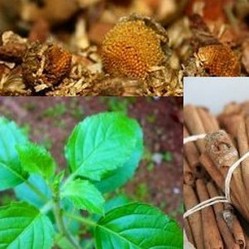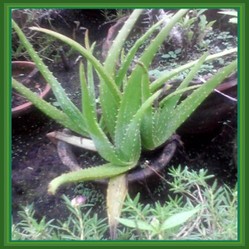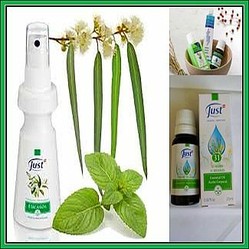Tulsi, also known as holy basil, is a species of basil that can be seen as a distant cousin of the familiar sweet basil plant used in western cooking. Tulsi has powerful medicinal properties, and is widely used in Ayurveda, the traditional medicine of India. In Ayurveda, tulsi is used to treat type II diabetes, as well as a number of other conditions. It is considered by modern herbalists to be an adaptogen, meaning an herb that has a normalizing effect on the body.
Tulsi has not been as thoroughly studied in the West as most Western herbs, but it shows promising preliminary evidence supporting many of its uses in Ayurvedic medicine, including its ability to treat type II diabetes.
Tulsi seems to be able to lower blood sugar, much like chamomile. Also of interest, tulsi shows strong evidence of being able to reduce stress and anxiety, and protect the body against damage caused by stress. As stress is one of the major factors that can aggravate type II diabetes, this herb is of special interest to diabetics. Like chamomile, however, tulsi also acts as an anticoagulant or blood thinner.
RateTea also has an extensive page about tulsi / holy basil, which has detailed information about the health and medicinal properties of this herb, citations to scientific studies on this herb' effectiveness, and ratings, reviews, and different sources of buying this herb.
Basil lovers may be pleased to learn that other types of basil, including Italian sweet basil, and Thai basil, contain many of the same chemical components as tulsi. It certainly cannot hurt to include these herbs in your diet as well.





 The Shaming of Femininity and Elevation of Masculinityon 07/13/2017
The Shaming of Femininity and Elevation of Masculinityon 07/13/2017
 What is Genderqueer or Non-Binary Gender?on 10/16/2015
What is Genderqueer or Non-Binary Gender?on 10/16/2015
 Resources for Learning Spanish Free Onlineon 04/13/2016
Resources for Learning Spanish Free Onlineon 04/13/2016
 Ways Native Plants Can Help Control Invasive Plantson 05/26/2016
Ways Native Plants Can Help Control Invasive Plantson 05/26/2016


Questions? Comments? Feedback?
I read about it in a book on diabetes, actually, a few months ago. I, too, was surprised that I hadn't learned about it sooner.
Yeah! Chamomile has lots of health properties besides just regulating blood sugar. I think that's true of most herbs, they have a variety of chemicals that impact health (and can be used medicinally) in different ways.
I hadn't heard of rooibos being used to lower blood sugar, but I glanced over some articles and I found that there's actually a lot written about this! Thank you for sharing that, I didn't know that and now I can put it on my list of things to research and add to this article and other articles.
Rooibos also lowers blood sugar!
I came back to this article, and am glad I did, because I had forgotten about chamomile. I looked it up online as well and it appears that it does more than simply lowering blood sugar; it also helps fight complications that arise from diabetes, such as vision loss.
Yeah! I've seen a wide range of studies on Tulsi, including a controlled clinical study that found it effective for treating depression and anxiety, and studies that suggest it may prevent Alzheimer's. It seems very healthy across the board, except for a few caveats like its blood thinner effect which may benefit some people but other people might need to be cautious about.
Incidentally, chamomile also has a blood thinning effect, which makes me wonder if it's just a coincidence that both have that effect as well as the effect of regulating blood sugar, or if there's some common mechanism for that.
Tulsi also helps fight cancer!
Thank you, both! I definitely think Tulsi is one of those herbs that could benefit a broad range of people. I've introduced a large number of people to tulsi, and it seems to have pretty close to universal appeal (although some people don't like the Vana variety as much, as it has a licorice aroma that some people object to). I've noticed that a far broader group of people tend to like tulsi than chamomile.
I also love how I feel after drinking tulsi. I find it very relaxing (probably more than chamomile), but I find it less likely to make me sleepy or tired (chamomile sometimes has this effect on me, mild, but noticeable, which I think makes sense because I often hear it recommended as a bedtime drink).
Tulsi is so amazing, that I think everyone should drink tulsi tea. I have so much more energy since I've started drinking it.
Nice article. I didn't know chamomile could help lower blood sugar. I'll look into this.